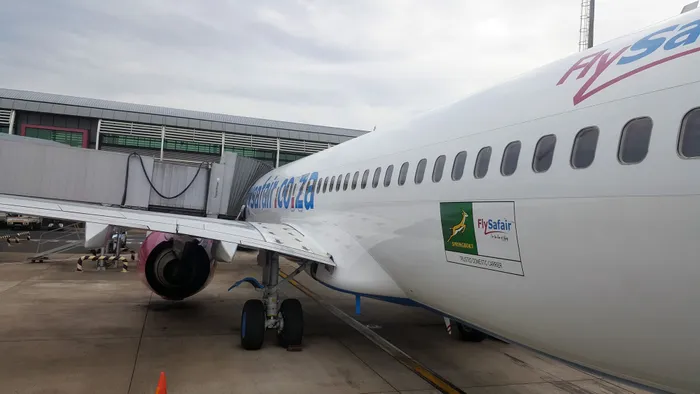FlySafair defends operations amid potential regulatory sanctions

Sources said these sanctions may also include directing FlySafair to comply with legislation within a specified period, suspending the licence temporarily, or cancelling it entirely. Picture: Simphiwe Mbokazi/Independent Newspapers
FlySafair has reaffirmed being steadfast in maintaining its efficiency as it confirmed making final representations to the International Air Services Licensing Council (IASLC) earlier this week.
This comes as both Domestic and International Air Services Licensing Councils are currently deliberating on possible sanctions on the airline for breaching the foreign ownership threshold in both its operational divisions.
The appearance this week, scheduled from a court ruling last year, was for the airline to make further submissions as the councils draw close to the matter, which may shift the South African landscape due to the airline’s dominant position.
“FlySafair remains steadfast in its commitment to delivering uninterrupted service throughout this process. Our flights continue to operate as scheduled and are receiving strong customer support,” said Kirby Gordon, FlySafair chief marketing officer.
“Notably, our on-time performance for the month to date stands at an impressive 94.13%, while customer satisfaction scores remain consistently high, reflecting the trust and confidence of our passengers. We await their decisions in due course. At this stage, no timelines for their communications have been shared with us.”
Gordon, however, was noncommittal on the airline’s contingency measures post the sanction by both councils, which may, at worst, be the grounding of its operations until it rights its ownership and effective control structure.
Sources said these sanctions may also include directing FlySafair to comply with legislation within a specified period, suspending the licence temporarily, or cancelling it entirely.
The airline has failed in a stop-gap appeal to the Minister of Transport, Barbara Creecy, for a ministerial exemption from certain provisions of the Air Service Licensing Act.
Creecy referred the matter to the councils, noting that the Domestic Air Services Licensing Council (DASLC) had met with FlySafair and complainant Global Aviation Operations recently for oral representations for mitigation and aggravation.
Creecy, who deemed the request premature, said in a statement it was not a foregone conclusion that the council will simply just cancel FlySafair’s licence and that the council has a legal requirement to notify FlySafair of its final decision.
She added that even if FlySafair emerged as the loser, it can still appeal any sanction and or seek high court relief.
Currently, FlySafair’s majority shareholder is the ASL Aviation Group, an Irish holding company, which owns 74.86% of the airline—a fraction shy of the legal threshold.
This has placed FlySafair in breach of both South African and international air services licensing regulations. The controversy stems from complaints lodged by competing airlines.
FlySafair argued this interpretation was impractical, as few individuals possess the capital required to own an airline.
The airline has warned that this strict reading of the law could also jeopardise the compliance of other major carriers.
The airline, which commands approximately 60% of the domestic market and operates up to 160 flights daily, transports about 30 000 passengers each day.
The sudden removal of this capacity would overwhelm other carriers, leaving passengers stranded and creating a significant bottleneck in air travel.
With limited alternative options, ticket prices are likely to surge, placing additional financial strain on consumers and potentially reducing access to affordable travel.
BUSINESS REPORT
FlySafair ownership threshold contravention could see it plucked off its routes
CemAir distances itself from industry overbooking practices, takes issue with FlySafair’s statement
Flysafair faces scrutiny over foreign ownership compliance
Consumer Commission Launches Probe into FlySafair's Overbooking Complaints
NCC investigates FlySafair's overbooking practices amid customer complaints